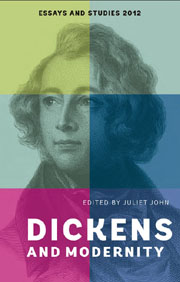Book contents
- Frontmatter
- Contents
- LIST OF ILLUSTRATIONS
- ACKNOWLEDGEMENTS
- NOTES ON THE CONTRIBUTORS
- INTRODUCTION
- 1 THE DICKENS TAPE: AFFECT AND SOUND REPRODUCTION IN THE CHIMES
- 2 DICKENS, SEXUALITY AND THE BODY; OR, CLOCK LOVING: MASTER HUMPHREY'S QUEER OBJECTS OF DESIRE
- 3 TEXTS, PARATEXTS AND ‘E-TEXTS’: THE POETICS OF COMMUNICATION IN DICKENS'S JOURNALISM
- 4 CORPUS STYLISTICS – DICKENS, TEXT-DRIVENNESS AND THE FICTIONAL WORLD
- 5 THINGS, WORDS AND THE MEANINGS OF ART
- 6 DICKENS AND THE CIRCUS OF MODERNITY
- 7 THE OLIVER! PHENOMENON; OR, ‘PLEASE, SIR, WE WANT MORE AND MORE!’
- 8 ‘WOW! SHE'S A LESBIAN. GOT TO BE!’: RE-READING/RE-VIEWING DICKENS AND NEO-VICTORIANISM ON THE BBC
- 9 OUT OF PLACE: DAVID COPPERFIELD'S IRRESOLVABLE GEOGRAPHIES
- 10 AFTERWORD: THE 2012 BICENTENARY
- Index
3 - TEXTS, PARATEXTS AND ‘E-TEXTS’: THE POETICS OF COMMUNICATION IN DICKENS'S JOURNALISM
Published online by Cambridge University Press: 05 February 2013
- Frontmatter
- Contents
- LIST OF ILLUSTRATIONS
- ACKNOWLEDGEMENTS
- NOTES ON THE CONTRIBUTORS
- INTRODUCTION
- 1 THE DICKENS TAPE: AFFECT AND SOUND REPRODUCTION IN THE CHIMES
- 2 DICKENS, SEXUALITY AND THE BODY; OR, CLOCK LOVING: MASTER HUMPHREY'S QUEER OBJECTS OF DESIRE
- 3 TEXTS, PARATEXTS AND ‘E-TEXTS’: THE POETICS OF COMMUNICATION IN DICKENS'S JOURNALISM
- 4 CORPUS STYLISTICS – DICKENS, TEXT-DRIVENNESS AND THE FICTIONAL WORLD
- 5 THINGS, WORDS AND THE MEANINGS OF ART
- 6 DICKENS AND THE CIRCUS OF MODERNITY
- 7 THE OLIVER! PHENOMENON; OR, ‘PLEASE, SIR, WE WANT MORE AND MORE!’
- 8 ‘WOW! SHE'S A LESBIAN. GOT TO BE!’: RE-READING/RE-VIEWING DICKENS AND NEO-VICTORIANISM ON THE BBC
- 9 OUT OF PLACE: DAVID COPPERFIELD'S IRRESOLVABLE GEOGRAPHIES
- 10 AFTERWORD: THE 2012 BICENTENARY
- Index
Summary
SINGING my days,
Singing the great achievements of the present,
Singing the strong light works of engineers,
Our modern wonders, (the antique ponderous Seven outvied,)
In the Old World the east the Suez canal,
The New by its mighty railroad spann'd,
The seas inlaid with eloquent gentle wires;
Yet first to sound, and ever sound, the cry with thee O soul,
The Past! the Past! the Past!
‘Passage to India’ (1870)The first stanza of Walt Whitman's extraordinary poem, with its inspired bathos and confident ‘poetics of ad-libbing’ (Donald Davie's phrase: 59), proclaims its aim to fuse, on both personal and public planes, a sense of the trajectory linking past with present, and today's technology with tomorrow's new possibilities. It also announces the public occasions for this rhapsodic outburst (which actually gets more uncertain the longer it lasts): namely the successful laying of a transatlantic submarine cable allowing telegraphic communication across the Atlantic (July 1865); the junction of the Union and Pacific railroads (May 1869), and the completion of the Suez canal project allowing ships to travel to the East from Europe and the New World without circumnavigating Africa (November 1869).
- Type
- Chapter
- Information
- Dickens and Modernity , pp. 61 - 93Publisher: Boydell & BrewerPrint publication year: 2012



